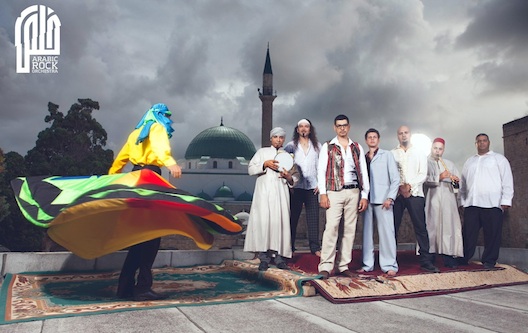How a Palestinian band crowdfunded their coming album


In the Middle East, indie
musicians often struggle to find consistent income in a small
and fragmented market. It can be difficult to garner a lot of
visibility online, but showcasing one's latest tracks has become
easier with the growth of Mideast Tunes.
The site, which was founded in
2010 by Mideast Youth, a collective of progressive young
Bahrainis, features a band's tracks, along with a short
biography and links to its websites and social media, allowing
users to browse and discover new music.
The majority of these bands might
not be able to rely on online track sales to sustain themselves, as
most of the music industry in the
Middle East (and the world, these days) is dependent upon live
shows for the bulk of their revenue, but many of the region's
bands and artists are coming up with unique and inventive marketing
strategies to showcase their work.
In our new Artist Entrepreneur
series, we'll take a look at how creatives in the region are
marketing themselves, and in the case of the music industry, how bands are surviving, what
they're doing to break through the noise, and how the industry is
changing with the shift towards digital consumption. Can
startups save the music industry? These are trying.
Khalas, an Arabic rock orchestra.
Check out their rock adaptation of Oum Kalthoum’s song “Inta Omri” below and see more on Mideast Tunes.
Making revenue hasn't been easy.
Abed Hathout, the guitarist and manager, has been hoping to quit
his day job to focus on Khalas for the past 12 years, but has been
unable to do so. “It’s hard here, in the Middle East, especially in
Palestine,” he points out. He wants to believe than a band can live
from its music, as long as it secures a deal with a record label to
produce and distribute an album.
To date, Khalas has recorded several tracks, but the revenue
they make from touring and
merchandising has been reinvested in the band, and is nowhere near
the amount necessary to record and distribute an album. That’s why
the band decided to ask their fans for some help.
Crowdfunding their album
The band, not aware at the launch of Zoomal, a crowdfunding platform for the Arab world, set up a crowdfunding campaign on Indiegogo, asking for US $7,000 to cover the album's production and the distribution. Perks to donors include exclusive songs, hard copies of the album, goodie bags, a Skype call with the band, and more.
During a month, the band has been heavily marketing the project, on Facebook, Twitter, Instagram, Mideastunes, and Reverbnation. They’ve also reached out to each of their fans personally, messaging each and every one of them; at time of print, around 5% of their fans had donated, they say, reaching US $4,000, enough to cover their recording expenses.
Distributing their album, online… and offline
Not reaching their goal doesn't matter, the band members say; the campaign was a great opportunity to connect with their fans. Now, to distribute the album, the band is trying to find a medium size indie label that can help find them the attention they need.
Othewise, the band members will dig into their own savings and possibly take out a loan to raise the remaining US $3,000. Nina Zidani, the band's designer, realizes that the album might not make enough to recover the costs, but believes that it's worth it.
Part of the expense involves releasing a hardcopy. While it's easy to distribute the album on Amazon, iTunes and the like, but, the band can't imagine distributing an album online only. Hathout can't imagine not holding the album in his hands, and for Zidani, “the artwork and packaging is an extension of the music.”
"Every band should [crowdfund] at some point”
Both Hathout and Zidani think that crowdfunding is the way to go, and offer their tips for other bands trying it:
- Know what you’re getting into:
“It’s not an easy job to do, you have to work on it daily. You have
to be prepared.” explains Zidani, before adding that they couldn’t
take a single day-off during the one month that the campaign
lasted.
- A one month campaign is enough,
explains Zidani. “It was probably the longest month in our
life.”
- Hire someone. Both band members
can’t help but imagine: what if someone spent six or seven hours on
the campaign everyday?
- Only go into it if you have fans, especially in the music industry, with large networks who can help out, they say.


